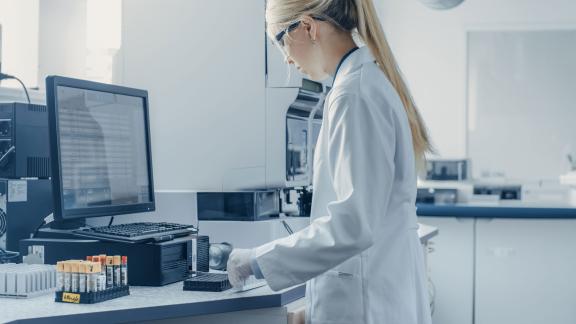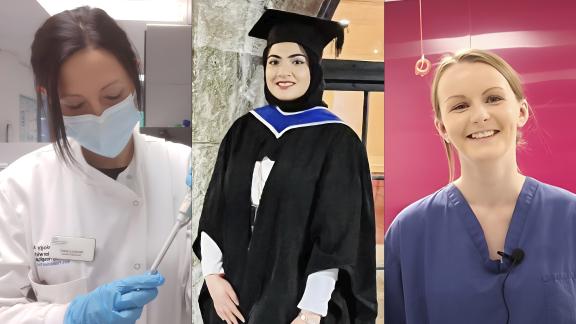Healthcare science

Who are healthcare scientists?
Healthcare scientists play a big role in patient care and are involved in 80 per cent of all clinical decisions made in the NHS. There are currently over 50,000 healthcare scientists in the NHS and public health services.
Healthcare science is a broad term encompassing a highly diverse scientific workforce. They can be found in many areas of the NHS alongside doctors, nurses and other healthcare professionals and are often developing new clinical and technological advances.
Do healthcare scientists work with patients?
Many healthcare science staff work directly with patients in a range of ways from monitoring breathing or heart rates to treating patients with hearing difficulties. While some staff work exclusively in labs.
What routes are available into healthcare science?
There are many routes into healthcare science to help build your workforce as shown by our your future healthcare scientist infographic.
T Levels
Healthcare science T Level enrollments will cease in September 2025. The Department for Education have made this decision after an evaluation of whether a separate T Level in this area is required in the long-term to meet the needs of employers and students.
It is suggested that students with an interest in healthcare science should do this through the Health T Level or Science T Level. For learners wanting to pursue a career in optical services, a new Level 3 apprenticeship is available.
Find out how Frimley Health NHS Foundation Trust piloted T Level industry placements in a range of clinical settings including healthcare science areas in our case study.
Healthcare science apprenticeships
Apprenticeships are a great way to attract and develop staff in healthcare science. A healthcare science apprentice could complete any of the following:
- healthcare assistant (Level 2)
- laboratory technician (Level 3)
- healthcare science associate (Level 4)
- healthcare science practitioner (Degree, Level 6).
These apprenticeships focus on various specialisms, from pharmaceutical and biotechnology to life science, physiological science, biomedical science, or physical science.
For more information about these apprenticeships and their specialisms, use the guidance on the National School of Healthcare Science website.
Employers should consider taking on healthcare apprentices. It enables those who have a real passion for the work that they do to give more and progress in their chosen field of work. This is good for both employee and employer, as the employer gets an experienced, enthusiastic and committed member of staff who are able to share knowledge through their invaluable on the job experience. In turn, the employee will feel valued, that they are making a difference as well as contributing in a greater capacity to the team and the work that they carry out.
Donna Foster, biomedical scientist and winner of the 2021 Advancing Healthcare Award as a healthcare science apprentice.
Scientist training programme
Staff on the programme are employed in a scientific department and follow a three-year training period with a mixture of academic learning and work-based, practical training, and receive a university-accredited masters degree. The programme is for science graduates with a 1st or 2:1 achievement and who meet NHS behaviours and values.
The training post is often salaried at NHS Agenda for Change Band 6 and upon graduating, staff will be eligible for clinical scientist registration with the Health and Care Professions Council (HCPC) and can apply for clinical scientist roles. More guidance can be found on the NHS England Scientist Training Programme webpage.
Higher specialist scientist training programme
The higher specialist scientist training (HSST) programme aims to increase the number of senior consultant clinical scientists, who can lead the development and innovation of new research and technology and deliver world-class outcomes for patient care.
The HSST programme is a five-year workplace-based training programme, supported by a doctorate-level academic programme.
The programme requires the staff member and the employer to develop a suitable job plan based on the specialism-specific curriculum.
Applicants are required to undergo a formal appointment and benchmarking process before the start of their training and must already be HCPC registered. Additional guidance on eligibility and information for employers and supervisors can be found on the NHS England Higher Specialist Scientist Training Programme webpage.
Did you know?
NHS England and the Academy for Healthcare Science are hosting a twelve month funded Senior Leadership Development Programme for Healthcare Scientists. To learn more visit, the Academy for Healthcare Science website.
Consultant clinical scientist
Consultant clinical scientists (CCS) are trained to a high level, combining years of scientific expertise and training in patient care, they oversee diagnosis, lead services and guide a range of healthcare staff. Staff must firstly complete the HSST programme to be eligible to apply for consultant clinical scientist roles.
Find out more about the CCS role on the NHS England Consultant Clinical Scientist webpage. Further information on CCS employment processes can also be found on The Royal College of Pathologists website.



